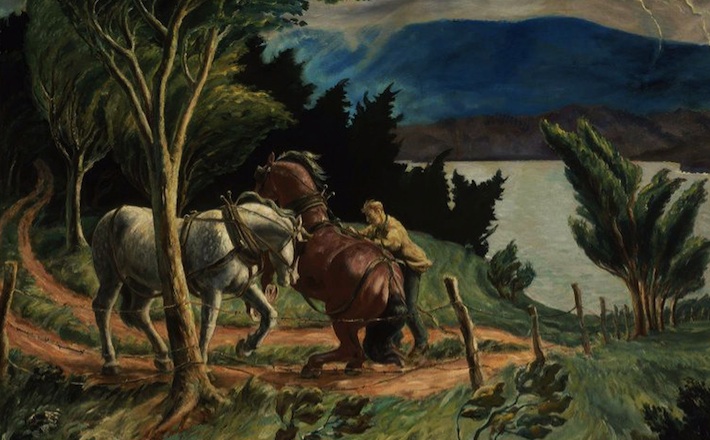Commentary on Hebrews 5:1-10
Hebrews 5:1 seems like one of those places where the chapter division might not be quite right.
The first four verses describe high priests in Israel’s sacrificial system, but the discussion of priesthood really began in 4:14 when the author arrived at the topic (first mentioned in 2:17) that would become his focus and his signature contribution to Christian thought. Having begun by asserting Jesus’ role as High Priest, in order to comfort the readers after a prolonged and intense warning (3:7-4:13), he now reminds his audience of important features of High Priests in general and Jesus in particular.
Other High Priests
Priests are, first, human. This statement may seem to be a painfully obvious point, but in light of his argument in chapter 2 that Jesus himself was fully human, it is an assertion worth making. Second, they serve a mediatorial role representing humans to God by offering gifts and sacrifices for sin. In both Jewish and Greco-Roman religious understandings of the time, correct relationship with the Deity was achieved through sacrifice. This is the priests’ unique function — to mend the relationship with God.
A good high priest not only maintains the vertical relationship but also acts graciously in his horizontal relationships. Hence, third, he can control his anger against his fellow humans who are ignorant or deceived because he, too, struggles with weakness. It is quite likely the author employs a subtle comparison here. Jesus suffers with (sumpatheo) his fellow humans (Hebrews 4:15). Other high priests are only able to regulate their anger against those they might consider as below them, as those not privy to the secret divine mysteries they are. Maybe, in fact, the restraint of anger rather than true sympathy is a feature of their weakness.
Finally, the author articulates an important distinction between these High Priests and Jesus. Jesus’ one difference from his fellow humans was that, while he suffered with all variety of temptations and trials, he did not succumb to sin (Hebrews 4:15). Not so with the other High Priests. These humans, like all others, are guilty of sins. Therefore, before they can offer sacrifices on behalf of others, they must perform a sacrifice for themselves, as the instructions for the Day of Atonement in the Levitical code demand (Leviticus 16:6 and 7).
If Hebrews 5:1 is a statement of fact and vss. 2-3 veer toward the negative, v. 4 is a more positive aspect of other High Priests. God called them to this role; they didn’t decide to take it up for themselves. The author appeals to the call of Aaron, Moses’ helpful brother (Exodus 28:1). Recalling this ancient process surely would serve to denigrate priests of more recent eras who through political intrigue, bribery, and war had secured the role for themselves.
Jesus the High Priest
Hebrews 5:5 begins the author’s discussion of Jesus’ priesthood. In a chiastic fashion, the author begins with his final point about other High Priests. Jesus too was called by God and did not seek to glorify himself by deciding to become a High Priest. The author’s proof for this assertion comes from Psalm 110, widely used by early Christian writers. He is the only author, however, to appeal to vs. 4 where God says to the heir of David that he is a priest. Interestingly, he appeals to God’s speech that Jesus would be his Son first (Psalm 2:7, quoted earlier in Hebrews 1:5). Jesus’ unique relationship to God as firstborn Son may very well be the fundamental factor that makes his priesthood different from all others.
The next paragraph could be read as a chart of comparisons between Jesus and the other High Priests (see chart below). As they are human (Hebrews 5:1) so too did Jesus share in flesh (5:7). Whereas they offered gifts and sacrifices (5:1), here the author focuses upon Jesus offering to God prayers and supplications (5:7). In so doing, he knows something important about God, namely that he is One who can save out of death. The author has represented the priests as a bit stoic, able to restrain their passion, but he depicts Jesus as very passionate, praying to God with great cries and tears. A modern audience might assume this indicates desperation and weakness, but to a Jewish audience, this would be seen as a sign of strength, namely the ability to pray honestly and passionately. At the first part of chapter 5, the author has said nothing about the effectiveness of the priests’ offerings, but he does say that Jesus’ offering of prayer was effective. God heard Jesus because of his reverence. He was not, as this audience is well aware, delivered before his death, but after it. He experienced what he knew was true about God’s ability to rescue out of death.
Finally, in contrast to the weak priests who succumb to sin, when Jesus suffered, he was obedient to God and through his obedience he became perfect. Most scholars believe that this odd assertion about Jesus (as God, wasn’t he already perfect?!) indicates that Jesus became fully prepared for his vocation, primarily as priest. He had to suffer death and then offer himself to God (as later chapters of the letter will draw out) to fulfill his priestly role of making an offering to God. Whereas the other priests offer sacrifices to God on behalf of others on a regular basis, Jesus’ priestly ministry not only maintains a relationship but achieves a new result. Those who follow this High Priest find eternal salvation, a different kind of relationship with God that will last forever.
The closing note indicates the author has more to say about this priesthood, for Jesus stands in the line of the enigmatic Old Testament figure Melchizedek, a subject to which he will return after another admonition and encouragement (Hebrews 5:11–6:20), but for his present point, the author has began his discussion of his insight that Jesus is a High Priest, but he is superior to any that have come before him.
Priests | Jesus |
Human | Human |
Priestly Vocation: Represent humans to God | Priestly Vocation: Cause of eternal salvation |
Offer gifts and sacrifices for sins | Offers prayers and supplications |
Emotive state: Control anger | Emotive state: Great cries and tears |
Beset with weakness | He was heard because of reverence |
Offers for people | People follow him |
Offers for self |
|
Didn’t take honor for himself | Appointed by God |
Called by God | Called by God |


October 18, 2015